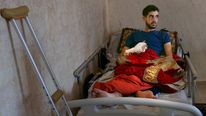17 sept 2016
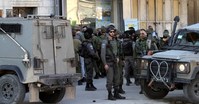
The Israeli Occupation Forces (IOF) stormed Saturday the family house of slain Palestinian Hatem Shaloudi, 25, in Tel Rumeida town in al-Khalil.
Family sources affirmed to the PIC reporter that Israeli forces broke into the house and violently searched its rooms before questioning the family members.
Shaloudi was shot and killed by Israeli gunfire after allegedly stabbing and lightly injuring an Israeli soldier near the Tel Rumeida area in al-Khalil Friday afternoon.
He was the third Palestinian to be killed by Israeli forces in less than 24 hours, after a Jordanian national, of Palestinian origin, was also shot dead on Friday by Israeli police in occupied Jerusalem while another Palestinian was shot and killed at the entrance of the Kiryat Arba settlement after an alleged car ramming attack.
Family sources affirmed to the PIC reporter that Israeli forces broke into the house and violently searched its rooms before questioning the family members.
Shaloudi was shot and killed by Israeli gunfire after allegedly stabbing and lightly injuring an Israeli soldier near the Tel Rumeida area in al-Khalil Friday afternoon.
He was the third Palestinian to be killed by Israeli forces in less than 24 hours, after a Jordanian national, of Palestinian origin, was also shot dead on Friday by Israeli police in occupied Jerusalem while another Palestinian was shot and killed at the entrance of the Kiryat Arba settlement after an alleged car ramming attack.
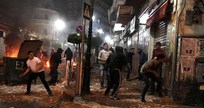
The Israeli Occupation Forces (IOF) arrested overnight two Palestinians, one of them a minor, from Kafer Qalil town south of Nablus after storming the town, which led to the outbreak of violent clashes.
Local sources affirmed that two locals aged 21 and 16 were detained during the overnight raid. Following the raid, violent clashes erupted in the town amid heavy firing of teargas bombs and rubber bullets.
Earlier yesterday, Israeli forces stormed Beita town south of the city and arrested a young man. Similar clashes broke out in Yabad town south of Jenin after IOF soldiers stormed the town and kidnapped two locals.
Local sources told the PIC reporter that Israeli forces stormed the eastern part of the town amid heavy firing of teargas bombs which led to the outbreak of the clashes.
Make-shift checkpoints were erected throughout the town, the sources added. Along the same line, Israeli forces arrested two minors from Yamon town west of Jenin after confiscating their motorcycle. The detainees were taken to Asker military camp near the town.
Local sources affirmed that two locals aged 21 and 16 were detained during the overnight raid. Following the raid, violent clashes erupted in the town amid heavy firing of teargas bombs and rubber bullets.
Earlier yesterday, Israeli forces stormed Beita town south of the city and arrested a young man. Similar clashes broke out in Yabad town south of Jenin after IOF soldiers stormed the town and kidnapped two locals.
Local sources told the PIC reporter that Israeli forces stormed the eastern part of the town amid heavy firing of teargas bombs which led to the outbreak of the clashes.
Make-shift checkpoints were erected throughout the town, the sources added. Along the same line, Israeli forces arrested two minors from Yamon town west of Jenin after confiscating their motorcycle. The detainees were taken to Asker military camp near the town.
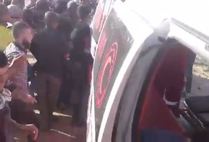
Israeli soldiers shot and injured, on Friday evening, three young Palestinian men with live fire, during clashes that took place east of Gaza city, and east of the al-Boreij refugee camp, in central Gaza.
The soldiers, stationed across the border fence near Nahal OZ military base, east of Gaza city, fired many live rounds at scores of young men protesting in an area close to the border fence, wounding a young man in his leg.
Medics rushed the young man to the Shifa hospital, west of Gaza city, suffering moderate injuries.
The soldiers also fired many gas bombs, causing scores of residents to suffer the severe effects of teargas inhalation.
In addition, soldiers stationed in a military base, across the border fence, east of the al-Boreij refugee camp in central Gaza, fired many live rounds at Palestinian protesters, wounding one in the arm and another in his thigh.
Both were moved to the Al-Aqsa hospital in nearby Deir al-Balah town, suffering moderate wounds.
The soldiers, stationed across the border fence near Nahal OZ military base, east of Gaza city, fired many live rounds at scores of young men protesting in an area close to the border fence, wounding a young man in his leg.
Medics rushed the young man to the Shifa hospital, west of Gaza city, suffering moderate injuries.
The soldiers also fired many gas bombs, causing scores of residents to suffer the severe effects of teargas inhalation.
In addition, soldiers stationed in a military base, across the border fence, east of the al-Boreij refugee camp in central Gaza, fired many live rounds at Palestinian protesters, wounding one in the arm and another in his thigh.
Both were moved to the Al-Aqsa hospital in nearby Deir al-Balah town, suffering moderate wounds.
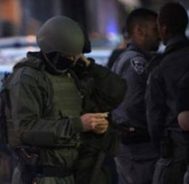
Palestinian medical sources have reported, on Friday evening, that a number of Israeli military jeeps invaded the al-Jalazoun refugee camp, north of Ramallah, and shot two young men with live fire, while many residents suffered the effects of teargas inhalation.
Eyewitnesses said that the soldiers invaded the refugee camp from several directions, and clashed with local youths, who hurled stones and empty bottles at the military vehicles.
The soldiers fired many live rounds, wounding two young men, in addition to firing dozens of gas bombs and rubber-coated steel bullets, causing scores of residents to suffer the severe effects of teargas inhalation.
Eyewitnesses said that the soldiers invaded the refugee camp from several directions, and clashed with local youths, who hurled stones and empty bottles at the military vehicles.
The soldiers fired many live rounds, wounding two young men, in addition to firing dozens of gas bombs and rubber-coated steel bullets, causing scores of residents to suffer the severe effects of teargas inhalation.
16 sept 2016
One is on the lower roof, two on the balcony of the apartment above the roof, and two more are looking out from the apartment window. A few teenage girls and children are looking at them from the neighboring roof. Total silence. Suddenly, the two soldiers on the balcony raise their hands, as though giving a signal, and one of them, the sniper, aims and starts shooting. On the roof of the building, Mohammed Amassi is hit. He falls to the ground and starts crawling for his life, bent on getting off the roof. Finally, a medical team gets him down via a ladder. The only thing Amassi is holding is his cell phone. Nothing about him could have seemed threatening to the soldiers on the roof opposite, about 80 meters (260 feet) away. The sniper took aim and fired, hitting him with round after round. The palm of one hand is covered with blood; he is writhing in pain, stunned.
A few weeks later, Amassi, 22, is in his living room, lying on a new adjustable bed that has been loaned to him by a Palestinian charity. He’s a good-looking young man, smiling and quiet. His family’s home is well kept, compared to others in Al-Fawwar — a hardscrabble refugee camp, the most southerly in the West Bank and the one that most closely resembles the refugee camps of the Gaza Strip, which isn’t all that far from here.
On August 16, a huge Israel Defense Forces raiding party, consisting of hundreds of soldiers, swooped into Al-Fawwar in the dead of night. In less than 24 hours, they killed one person and wounded dozens more. Their haul: two old pistols. (Amira Hass wrote about this unbelievable operation, “One killed and dozens wounded at a Palestinian refugee camp, all for two pistols,” in Haaretz, August 21.) The local residents are convinced the raid was nothing more than a training exercise carried out at their expense.
We arrived at Al-Fawwar on the eve of Id al-Adha (the feast of the sacrifice). In the butcher shop, a cow was being sliced up for the holiday. Those who can afford meat congregated around the animal, waiting for their portion. The IDF rarely carries out raids in this crowded camp, where about 10,000 people live in an area of one square kilometer. The troops haven’t returned since the raid.
Amassi is the son of the camp’s baker, Ibrahim Amassi, and the eldest of six siblings. Their family bakery was the first in Al-Fawwar, dating from the foundation of the refugee camp in the early 1950s. In recent years, it’s produced mainly pretzels, cookies and special doughs for traditional dishes. Mohammed studied interior design, but afterward became a baker to help provide for the family. He works two shifts a day, morning and afternoon, seven days a week. He has never been arrested or even been interrogated by Israeli authorities. Above the living room in which he is now recovering, another apartment is being built: he will live there when he marries and has a family of his own.
His hand is bandaged, and both legs are marked with wounds and scars from the shooting and subsequent surgery. Bedridden, Amassi continues to suffer from intense pain. It’s not clear whether he will be able either to walk again or to use his hand. At the moment, he can only hobble around with the aid of crutches. On the day of the big raid last month, his younger siblings woke him at 6:30 A.M., three hours after the soldiers entered the camp. The troops were scouring the alleys and seizing control of buildings. At first, the camp’s inhabitants thought the soldiers had come to demolish the home of Mohammed al-Shobaki, who stabbed an IDF soldier last November and was killed afterward. However, it soon became apparent that the troops had other intentions, though it was not clear what they were.
Watching the show
The whole camp was up on rooftops, watching the show, and Amassi was no exception. His house has two roofs: one, with a low rail, where people sit on hot summer nights; and above it an unfenced roof, for the water tank and satellite dish. Amassi climbed onto the upper roof to get a better view. It’s dangerous there: Without the fence, there’s no place to take cover. Teams from Ma’an and the television channel Palestine Today were positioned on the roof of the adjacent building, which offers better protection from the soldiers. Clashes were taking place between soldiers and stone throwers on the camp’s main street, but quiet prevailed here, on the high hill where this neighborhood stands.
The troops seized quite a few houses — about 30, according to Musa Abu Hashhash, a field researcher for the Israeli human rights organization B’Tselem — and carried out searches in about 200 homes, smashing holes in some walls for snipers. At about 9 A.M., Amassi was talking to the reporters on the next-door roof. Suddenly he heard a soldier who was deployed on the balcony of the building below his call to him in Arabic: “Where do you want to get it?” Amassi was petrified. He knew what this meant: In which part of your body do you want to be shot?
According to Amassi, there was nothing to account for the soldier’s chilling question. The street was quiet, and Mohammed had done nothing that could be construed as a threat to the troops, who were 80 meters away as the crow flies. His father, Ibrahim, believes the soldiers shot his son in order to demonstrate their power to the camera crews on the roof next door.
“What did the soldier say to you?” Amassi’s friend, Ismail Najar, asked from the neighboring roof. But before Amassi could answer, he saw the soldier take aim and start shooting at him. Three bullets struck him in rapid succession. The first slammed into his left leg next to the knee, the second hit him between his hip and his left thigh, the third smashed into his right leg. When he raised his hands and called out to the soldier, “Enough, enough,” the sniper fired one more round, perhaps as an encore. The final bullet hit him in the palm of his hand. They were 0.22-inch Ruger, or Toto, bullets and didn’t kill him
Amassi then tried to find shelter on an exposed roof that has no shelter. He could have fallen off. In the edited Ma’an video, he’s seen crawling desperately. A flimsy, makeshift iron ladder — which I was afraid to climb — is the only way to gain access the upper roof. Somehow, the paramedics got him down. They carried him by foot for about 150 meters up the narrow alley to their ambulance, which took a soldier-bypass route to get him to Al-Ahli Hospital in nearby Hebron. Amassi was semiconscious. Damage had been done to blood vessels. To avoid having to amputate his leg, he was moved to Hebron’s other hospital, Alia. But they, too, did not have the necessary specialist. That evening, he was transferred to the Ramallah Government Hospital, where he underwent surgery.
In reply to a query from Haaretz, the IDF Spokesperson’s Unit stated this week: “On August 16, a military operation was conducted in Al-Fawwar refugee camp, with the aim of thwarting and striking at the terrorist infrastructures that exist throughout the camp. The operation included extensive searches to seize combat means and also the arrest of five wanted individuals. During the operation, army forces came under live fire and violent disturbances developed, which included the throwing of stones and cinder blocks, and dozens of explosive devices and Molotov cocktails, to which the forces responded with crowd dispersal means and shooting. The video mentioned is edited tendentiously and does not reflect the violent situation that developed in the refugee camp.”
Amassi spent 10 days in the Ramallah hospital. One bullet remains lodged deep inside, somewhere between his waist and hip and left thigh, and the physicians aren’t sure they will be able to remove it. If not, he will probably have to undergo additional surgery in Jordan. Next to his bed is a plastic jar containing the two bullet fragments that were successfully extracted from his body. He’s taking five different types of painkillers to try to relieve the suffering.
We leave him and go up to the roof. There are tangled iron rods where he fell. A few hours after he was shot, troops killed Mohammed Abu Hashhash, 19, who was shot the instant he stepped out of his house, a few hundred meters away, on another street. The soldiers opened fire through a breach they made in the wall of a neighboring house. That breach, together with a painting of the dead teenager on the wall, constitute a monument to a young man whose killing was probably as unnecessary as the shooting of the young baker in Al-Fawwar.
A few weeks later, Amassi, 22, is in his living room, lying on a new adjustable bed that has been loaned to him by a Palestinian charity. He’s a good-looking young man, smiling and quiet. His family’s home is well kept, compared to others in Al-Fawwar — a hardscrabble refugee camp, the most southerly in the West Bank and the one that most closely resembles the refugee camps of the Gaza Strip, which isn’t all that far from here.
On August 16, a huge Israel Defense Forces raiding party, consisting of hundreds of soldiers, swooped into Al-Fawwar in the dead of night. In less than 24 hours, they killed one person and wounded dozens more. Their haul: two old pistols. (Amira Hass wrote about this unbelievable operation, “One killed and dozens wounded at a Palestinian refugee camp, all for two pistols,” in Haaretz, August 21.) The local residents are convinced the raid was nothing more than a training exercise carried out at their expense.
We arrived at Al-Fawwar on the eve of Id al-Adha (the feast of the sacrifice). In the butcher shop, a cow was being sliced up for the holiday. Those who can afford meat congregated around the animal, waiting for their portion. The IDF rarely carries out raids in this crowded camp, where about 10,000 people live in an area of one square kilometer. The troops haven’t returned since the raid.
Amassi is the son of the camp’s baker, Ibrahim Amassi, and the eldest of six siblings. Their family bakery was the first in Al-Fawwar, dating from the foundation of the refugee camp in the early 1950s. In recent years, it’s produced mainly pretzels, cookies and special doughs for traditional dishes. Mohammed studied interior design, but afterward became a baker to help provide for the family. He works two shifts a day, morning and afternoon, seven days a week. He has never been arrested or even been interrogated by Israeli authorities. Above the living room in which he is now recovering, another apartment is being built: he will live there when he marries and has a family of his own.
His hand is bandaged, and both legs are marked with wounds and scars from the shooting and subsequent surgery. Bedridden, Amassi continues to suffer from intense pain. It’s not clear whether he will be able either to walk again or to use his hand. At the moment, he can only hobble around with the aid of crutches. On the day of the big raid last month, his younger siblings woke him at 6:30 A.M., three hours after the soldiers entered the camp. The troops were scouring the alleys and seizing control of buildings. At first, the camp’s inhabitants thought the soldiers had come to demolish the home of Mohammed al-Shobaki, who stabbed an IDF soldier last November and was killed afterward. However, it soon became apparent that the troops had other intentions, though it was not clear what they were.
Watching the show
The whole camp was up on rooftops, watching the show, and Amassi was no exception. His house has two roofs: one, with a low rail, where people sit on hot summer nights; and above it an unfenced roof, for the water tank and satellite dish. Amassi climbed onto the upper roof to get a better view. It’s dangerous there: Without the fence, there’s no place to take cover. Teams from Ma’an and the television channel Palestine Today were positioned on the roof of the adjacent building, which offers better protection from the soldiers. Clashes were taking place between soldiers and stone throwers on the camp’s main street, but quiet prevailed here, on the high hill where this neighborhood stands.
The troops seized quite a few houses — about 30, according to Musa Abu Hashhash, a field researcher for the Israeli human rights organization B’Tselem — and carried out searches in about 200 homes, smashing holes in some walls for snipers. At about 9 A.M., Amassi was talking to the reporters on the next-door roof. Suddenly he heard a soldier who was deployed on the balcony of the building below his call to him in Arabic: “Where do you want to get it?” Amassi was petrified. He knew what this meant: In which part of your body do you want to be shot?
According to Amassi, there was nothing to account for the soldier’s chilling question. The street was quiet, and Mohammed had done nothing that could be construed as a threat to the troops, who were 80 meters away as the crow flies. His father, Ibrahim, believes the soldiers shot his son in order to demonstrate their power to the camera crews on the roof next door.
“What did the soldier say to you?” Amassi’s friend, Ismail Najar, asked from the neighboring roof. But before Amassi could answer, he saw the soldier take aim and start shooting at him. Three bullets struck him in rapid succession. The first slammed into his left leg next to the knee, the second hit him between his hip and his left thigh, the third smashed into his right leg. When he raised his hands and called out to the soldier, “Enough, enough,” the sniper fired one more round, perhaps as an encore. The final bullet hit him in the palm of his hand. They were 0.22-inch Ruger, or Toto, bullets and didn’t kill him
Amassi then tried to find shelter on an exposed roof that has no shelter. He could have fallen off. In the edited Ma’an video, he’s seen crawling desperately. A flimsy, makeshift iron ladder — which I was afraid to climb — is the only way to gain access the upper roof. Somehow, the paramedics got him down. They carried him by foot for about 150 meters up the narrow alley to their ambulance, which took a soldier-bypass route to get him to Al-Ahli Hospital in nearby Hebron. Amassi was semiconscious. Damage had been done to blood vessels. To avoid having to amputate his leg, he was moved to Hebron’s other hospital, Alia. But they, too, did not have the necessary specialist. That evening, he was transferred to the Ramallah Government Hospital, where he underwent surgery.
In reply to a query from Haaretz, the IDF Spokesperson’s Unit stated this week: “On August 16, a military operation was conducted in Al-Fawwar refugee camp, with the aim of thwarting and striking at the terrorist infrastructures that exist throughout the camp. The operation included extensive searches to seize combat means and also the arrest of five wanted individuals. During the operation, army forces came under live fire and violent disturbances developed, which included the throwing of stones and cinder blocks, and dozens of explosive devices and Molotov cocktails, to which the forces responded with crowd dispersal means and shooting. The video mentioned is edited tendentiously and does not reflect the violent situation that developed in the refugee camp.”
Amassi spent 10 days in the Ramallah hospital. One bullet remains lodged deep inside, somewhere between his waist and hip and left thigh, and the physicians aren’t sure they will be able to remove it. If not, he will probably have to undergo additional surgery in Jordan. Next to his bed is a plastic jar containing the two bullet fragments that were successfully extracted from his body. He’s taking five different types of painkillers to try to relieve the suffering.
We leave him and go up to the roof. There are tangled iron rods where he fell. A few hours after he was shot, troops killed Mohammed Abu Hashhash, 19, who was shot the instant he stepped out of his house, a few hundred meters away, on another street. The soldiers opened fire through a breach they made in the wall of a neighboring house. That breach, together with a painting of the dead teenager on the wall, constitute a monument to a young man whose killing was probably as unnecessary as the shooting of the young baker in Al-Fawwar.
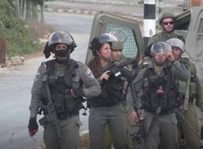
Israeli soldiers invaded, on Friday evening, the town of Beit Ummar, north of the southern West Bank city of Hebron, fired many gas bombs, including a new type of smokeless bombs, and rubber-coated steel bullets, wounding many Palestinians, and kidnapped a teenager.
Mohammad Awad, the media coordinator of the Popular Committee in Beit Ummar, said the soldiers invaded the center of the town, and closed the Baq’a street with their military vehicles, preventing the residents from crossing.
The soldiers harassed and questioned many Palestinians, and conducted provocative acts that led to clashes between many locals, who hurled stones at the military vehicles, and the soldiers who fired gas bombs and rubber-coated steel bullets.
Awad said the soldiers used a new type of gas bombs that do no produce smoke, but a strong smell that causes the people to choke, and faint.
Medics rushed to the town and provided the wounded Palestinians with the needed medical treatment, and the soldiers kidnapped a teenager, identified as Anan Adel Abu Ayyash, 17.
Mohammad Awad, the media coordinator of the Popular Committee in Beit Ummar, said the soldiers invaded the center of the town, and closed the Baq’a street with their military vehicles, preventing the residents from crossing.
The soldiers harassed and questioned many Palestinians, and conducted provocative acts that led to clashes between many locals, who hurled stones at the military vehicles, and the soldiers who fired gas bombs and rubber-coated steel bullets.
Awad said the soldiers used a new type of gas bombs that do no produce smoke, but a strong smell that causes the people to choke, and faint.
Medics rushed to the town and provided the wounded Palestinians with the needed medical treatment, and the soldiers kidnapped a teenager, identified as Anan Adel Abu Ayyash, 17.
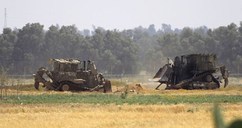
Two Israeli bulldozers Thursday afternoon entered the eastern part of al-Bureij in central Gaza Strip and proceeded to level lands near the border.
Witnesses said that two Israeli military bulldozers entered Palestinian lands under the protection of Israeli tanks stationed along the border fence.
The incursion is another episode in the series of Israeli daily violations of the Cairo-brokered truce accord signed in the wake of last summer’s offensive on the besieged coastal enclave, which killed over 2,300 Palestinians, mostly civilians.
Witnesses said that two Israeli military bulldozers entered Palestinian lands under the protection of Israeli tanks stationed along the border fence.
The incursion is another episode in the series of Israeli daily violations of the Cairo-brokered truce accord signed in the wake of last summer’s offensive on the besieged coastal enclave, which killed over 2,300 Palestinians, mostly civilians.
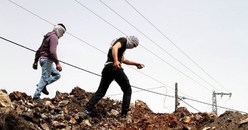
Violent clashes erupted Thursday evening in Burin town south of Nablus between Israeli forces and local youths.
Eyewitnesses affirmed that the clashes broke out when Israeli forces chased a number of children and detained them for several hours before being released.
Burin town is daily subjected to similar attacks by Israeli forces as it is located near the Israeli illegal settlement of Yitzhar.
Eyewitnesses affirmed that the clashes broke out when Israeli forces chased a number of children and detained them for several hours before being released.
Burin town is daily subjected to similar attacks by Israeli forces as it is located near the Israeli illegal settlement of Yitzhar.
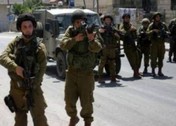
Israeli soldiers invaded, late on Thursday at night, the town of Zabbouba, west of the northern West Bank city of Jenin, clashed with local youths and fired many gas bombs, causing several Palestinians to suffer the effects of teargas inhalation.
The soldiers invaded the town from several directions and drove around its neighborhoods, before clashing with local youths, who hurled stone and empty bottles on them, while the soldiers fired gas bombs and rubber-coated steel bullets.
Medics rushed to the town and provided the needed aid to the wounded Palestinians.
The soldiers invaded the town from several directions and drove around its neighborhoods, before clashing with local youths, who hurled stone and empty bottles on them, while the soldiers fired gas bombs and rubber-coated steel bullets.
Medics rushed to the town and provided the needed aid to the wounded Palestinians.
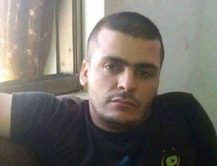
Mohammad Ahmad Abdul-Fattah Saraheen 30
Israeli soldiers shot and killed, on Thursday evening, a Palestinian man from Beit Ola town, west of Hebron in the southern part of the occupied West Bank, during a scuffle that took place after the soldiers broke into his home. The man was injured before the soldiers kidnapped him and his father, and later announced his death.
The Palestinian District Coordination Office (DCO) said the soldiers broke into the family home Mohammad Ahmad Abdul-Fattah Saraheen, 30, leading to the scuffle inside the property.
The soldiers then shot and injured Mohammad, before cuffing him along with his father, Ahmad, and kidnapped them. The army later announced the young man’s death; the father is still held by the army.
The fatal shooting took place after a number of army vehicles invaded Beit Ola, and clashed with several youngsters who hurled stones and empty bottles on them, while the soldiers fired gas bombs, concussion grenades and rubber-coated steel bullets, and broke into homes.
In Bethlehem, the soldiers invaded Beit Sahour town, east of the city, and kidnapped a young man, identified as Ramzi Ahmad Khleif, 41.
In Jerusalem, the soldiers kidnapped a young man from a store in Hizma town, east of the city, and confiscated his car. The army claimed to receive information that the man ‘intended to carry out a stabbing attack.”
Israeli soldiers shot and killed, on Thursday evening, a Palestinian man from Beit Ola town, west of Hebron in the southern part of the occupied West Bank, during a scuffle that took place after the soldiers broke into his home. The man was injured before the soldiers kidnapped him and his father, and later announced his death.
The Palestinian District Coordination Office (DCO) said the soldiers broke into the family home Mohammad Ahmad Abdul-Fattah Saraheen, 30, leading to the scuffle inside the property.
The soldiers then shot and injured Mohammad, before cuffing him along with his father, Ahmad, and kidnapped them. The army later announced the young man’s death; the father is still held by the army.
The fatal shooting took place after a number of army vehicles invaded Beit Ola, and clashed with several youngsters who hurled stones and empty bottles on them, while the soldiers fired gas bombs, concussion grenades and rubber-coated steel bullets, and broke into homes.
In Bethlehem, the soldiers invaded Beit Sahour town, east of the city, and kidnapped a young man, identified as Ramzi Ahmad Khleif, 41.
In Jerusalem, the soldiers kidnapped a young man from a store in Hizma town, east of the city, and confiscated his car. The army claimed to receive information that the man ‘intended to carry out a stabbing attack.”
15 sept 2016
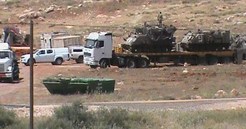
The Israeli Occupation Forces (IOF) are scheduled to carry out large military drills over the next week “in anticipation of any future war,” Israeli media sources said.
The sources pointed out that the planned military drills came in anticipation of any future war or any expected earthquake.
The military drills include the firing of nearly 1,500 rockets per day throughout the Palestinian territories, according to the sources. The drills also include the eviction of some settlements near the border of Gaza for fear of any resistance operation.
The sources predicted that between 350 and 500 Israeli settlers would be killed in case of the outbreak of a one-month long war with Palestinians.
The sources pointed out that the planned military drills came in anticipation of any future war or any expected earthquake.
The military drills include the firing of nearly 1,500 rockets per day throughout the Palestinian territories, according to the sources. The drills also include the eviction of some settlements near the border of Gaza for fear of any resistance operation.
The sources predicted that between 350 and 500 Israeli settlers would be killed in case of the outbreak of a one-month long war with Palestinians.
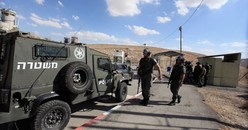
The Israeli Occupation Forces (IOF) arrested Thursday a Palestinian young man and his father after shooting and injuring him.
Local sources affirmed that Israeli forces stormed Beit Walla town west of al-Khalil amid heavy firing of teargas bombs and targeted local houses with rubber bullets.
Two residents, a father and his son, were detained during the raid. The son, Mohamed Abdul Sarahin, was shot and injured before his detention, the sources pointed out.
Along the same line, Israeli forces arrested a Palestinian young man after breaking into his commercial shop in Hazma town near occupied Jerusalem for allegedly planning to carry out an anti-occupation attack.
Israeli media sources claimed that a “wanted” Palestinian was arrested in Hazma town after confiscating his vehicle. Since morning hours, Israeli forces intensified their presence near the town under the pretext of looking for an “attacker”.
Local sources affirmed that Israeli forces stormed Beit Walla town west of al-Khalil amid heavy firing of teargas bombs and targeted local houses with rubber bullets.
Two residents, a father and his son, were detained during the raid. The son, Mohamed Abdul Sarahin, was shot and injured before his detention, the sources pointed out.
Along the same line, Israeli forces arrested a Palestinian young man after breaking into his commercial shop in Hazma town near occupied Jerusalem for allegedly planning to carry out an anti-occupation attack.
Israeli media sources claimed that a “wanted” Palestinian was arrested in Hazma town after confiscating his vehicle. Since morning hours, Israeli forces intensified their presence near the town under the pretext of looking for an “attacker”.
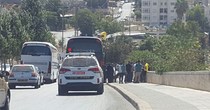
Four Israeli military vehicles chased a Palestinian bus while on its way to receive the liberated prisoner Mahmoud Abdul Latif, 25, from Negev prison.
Local sources affirmed that Israeli police detained the bus near Wadi al-Jouz area east of occupied Jerusalem and violently attacked four of its passengers.
The prisoner Abdul Latif who was arrested in October 2015 for a Facebook post, is scheduled to be released today from Negev prison after serving his one-year sentence.
Abdul Latif was earlier arrested more than once by Israeli police and kept in house arrest for his activism in al-Aqsa Mosque.
Local sources affirmed that Israeli police detained the bus near Wadi al-Jouz area east of occupied Jerusalem and violently attacked four of its passengers.
The prisoner Abdul Latif who was arrested in October 2015 for a Facebook post, is scheduled to be released today from Negev prison after serving his one-year sentence.
Abdul Latif was earlier arrested more than once by Israeli police and kept in house arrest for his activism in al-Aqsa Mosque.
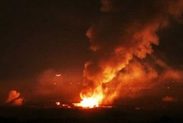
The Israeli Air Force fired, on Thursday at dawn, a number of missiles into several areas, believed to be run by the Al-Qassam Brigades of Hamas, in different parts of the Gaza Strip.
Some of the missiles detonated in open lands in a Qassam site, in the Shaima’ area, northwest of Beit Lahia in the northern part of the Gaza Strip. The Al-Qassam Brigades said the missiles caused property damage, and fires, but did not lead to any casualties.
A second strike also targeted a Qassam center in the Shaima’ area, northwest of Beit Lahia, causing excessive damage.
A third strike targeted another Qassam center in the Sheja’eyya neighborhood, east of Gaza City, causing damage.
The Israeli army said it targeted the Qassam centers in Gaza after a mortar shell landed in an open area in the Eshkol Regional Council, on Wednesday evening, and that the shell caused no casualties or property damage.
Some of the missiles detonated in open lands in a Qassam site, in the Shaima’ area, northwest of Beit Lahia in the northern part of the Gaza Strip. The Al-Qassam Brigades said the missiles caused property damage, and fires, but did not lead to any casualties.
A second strike also targeted a Qassam center in the Shaima’ area, northwest of Beit Lahia, causing excessive damage.
A third strike targeted another Qassam center in the Sheja’eyya neighborhood, east of Gaza City, causing damage.
The Israeli army said it targeted the Qassam centers in Gaza after a mortar shell landed in an open area in the Eshkol Regional Council, on Wednesday evening, and that the shell caused no casualties or property damage.
